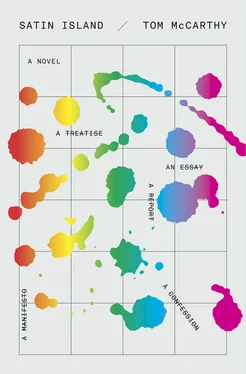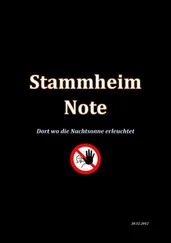13.2I pressed her further, of course. I felt that I was finally getting somewhere. She corrected herself a little now: it was really her boyfriend of the time who’d been the activist, she told me. He and his friends and associates, his general social circle, would descend on all these big G8 events. This time, they had converged from all around the world on Genoa. They’d stayed with scores of people, in a school building in the middle of the city, where the classrooms had been turned into dormitories, independent media centres and discussion rooms. It wasn’t only protestors: there were journalists and academics too, she said. The gathering had the air of a big carnival, a circus of ideas. Sounds fun, I said. It was, she said, until the police arrived. They kicked down the school’s doors in the small hours of the morning, when everyone was asleep, rushed up into the dorms and started attacking people in their beds. Shit, I said. Yes, she answered. As soon as people on the top floor realized what was going on, we ran out to the fire escapes — but police were waiting on these too. The raid was well-planned. So what did you do? I asked. We held our hands up and surrendered, she said. But that didn’t matter: they attacked us too. They stamped on people’s legs, and heads, and chests; I saw this one guy’s chest crumple as they stamped on it — and heard his ribs cracking too. It’s a strange sound, she told me; a bit like those old chocolate bars — the ones with the synthetic honeycomb inside, that used to crunch when you bit into them. Crunchies? I asked. Yes, she answered, that’s right: Crunchies. Those were good, I said. Yes, she concurred; I’m not sure you can get them anymore.
13.3Why have I never heard about this episode? I asked. I’ve never spoken about it before, she said. No, I said, I mean why didn’t I read about it in the press — especially if there were journalists there, staying in the very building where it happened? U., she said, this took place in the late summer of 2001, just before September the eleventh. After that, all other news was blown out of the water: no one was interested in what had gone on in Genoa, or anywhere else. It was as though it had never taken place. She paused, while our main course was laid in front of us. I’d ordered pork; she’d chosen chicken, I think — either that or duck. We sat in silence for a few seconds after the waitress had left, tasting our food. Then Madison picked up where she’d left off. Sometimes, she said, I even wonder if it actually took place myself. Are you still in touch with people from that time? I asked. My boyfriend’s circle, you mean? she asked back. I nodded. No, she said: I don’t have any contact with them. And besides, I don’t think they’re a circle anymore.
13.4The Project’s first phase had gone live: it was up and running, rolled out, operational, whatever. Its implementation had been deemed a great success. By whom? I don’t know. Deemers. And the Company’s contribution had been praised, by praisers, as quite brilliant. And my own input into this had been held up and singled out, by Peyman himself, as particularly productive. All this was going to my head. I even glanced about the restaurant, to see if anybody recognized me. This was ridiculous, of course: the people there had probably never even heard about Koob-Sassen, let alone my role in it. And this, perhaps, was not a bad thing, after all: the thwarted saboteurs that I myself had mobilized then turned my back on, the hit squads of vengeful revolutionaries, wouldn’t know who to shoot when they came looking for the traitor.
13.5Did you get stamped on? I asked Madison. I got pushed down the fire escape, she said. I bruised myself, but it wasn’t that bad. And that was it? I asked. Did the police leave after that? Madison laughed into her food: a sudden, short laugh that was like a cough. No, U., she said; that wasn’t it at all. That was just the beginning. So what happened next? I asked. The police rounded us up, she said. They got us all into a courtyard, about a hundred people, and they hemmed us in and formed a human square around us, two or more thick, and took it in turns to wade in to the middle of this square and club people and stamp on them some more. Then they made us walk out to these trucks that were parked just outside. Hadn’t you heard them pulling up? I asked. No, she replied. They put us in these trucks, and drove us to a police station. They unloaded us into some other courtyard there, where there were lots more police, fresh ones, all fired up and ready to let loose. Which is exactly what they did: they clubbed and stamped on people to their hearts’ content. And all the time, more and more captured demonstrators were arriving: people I didn’t recognize, who’d been staying in other places — hostels, houses, student dormitories. Truck after truck would pull up, and these people, all bruised and bloodied just like us, would be led out of them, and fed into the middle of this square whose sides were made of policemen, and then beaten up some more.
13.6How long did this go on for? I asked her. It’s hard to tell, said Madison. Perhaps an hour. When new people stopped arriving and the ones already there couldn’t stand up to be beaten anymore, or didn’t even react much when they were kicked and stamped on, the police eased off a bit. New officers came out of the main station holding sheets of paper, instructions or something, and after consulting these for a while, they started organizing all the people in the courtyard into groups. I don’t know what the logic of it was: it’s not as though they just divvied the crowd up into blocks where we were standing. Instead, they’d make five of us go and stand in one corner of the courtyard, then bring two more people over from some other part, and two more from a third, and make us stand in rows of three, like soldiers — three rows of three, so there were nine in every group. Then they might move four people out of one group and make them join another group in the far corner while they brought in three from yet another group and one more from another still to bring the number up to nine again. Whatever rationale was behind it, they carried out this sorting quite assiduously, for a long time. Then, eventually, one by one, the groups were marched into the station building itself.
13.7Our plates, largely untouched, were lying in front of us. The waitress had skirted by a couple of times, to see if everything was all right. It was a good restaurant. Most other diners were on their dessert course, or their coffee. The ones paying their bills and leaving weren’t being replaced by others; it was well into mid-afternoon. What happened when you came inside the building? I asked Madison. Well, she said, everyone was singing. Singing? I repeated. Yes, she said. The police were singing? I asked. No, she said; mainly the demonstrators. Protest songs, you mean? I asked. God no, she answered: they were singing songs the police were making them sing. Someone in Madison’s group, an Italian guy, had whispered to her that they were fascist songs, from Mussolini’s time. The cops had been leading the singing, moving their batons like conductors do. If anybody didn’t sing, Madison explained, or didn’t sing loud enough, the police would jerk the batons’ ends into their midriffs, upwards, from below — which would knock the wind out of them, of course, but then they had to sing immediately afterwards, wind or no wind, or they’d get another jerk. What if you didn’t know the words? I asked. They taught us the words, she answered — like in nursery school: it was a sing-along. While it went on, they carried on dividing up the groups: breaking them down into smaller groups of about five people, then separating these out into clusters of two or three. We had to sing while they were doing this to us, she said. It was so strange. Eventually, I found myself with just one other woman. She was German, I think. She couldn’t really say much since her jaw had been all smashed up. And besides, we couldn’t talk: we had to keep on singing — singing Italian words. This woman couldn’t do this very well, of course; but since the cops would baton-jerk her if she stopped, she forced the words out somehow, without really shaping them properly in her mouth. I got the sense that she was German all the same, said Madison, just from the way the sound came from her throat.
Читать дальше












